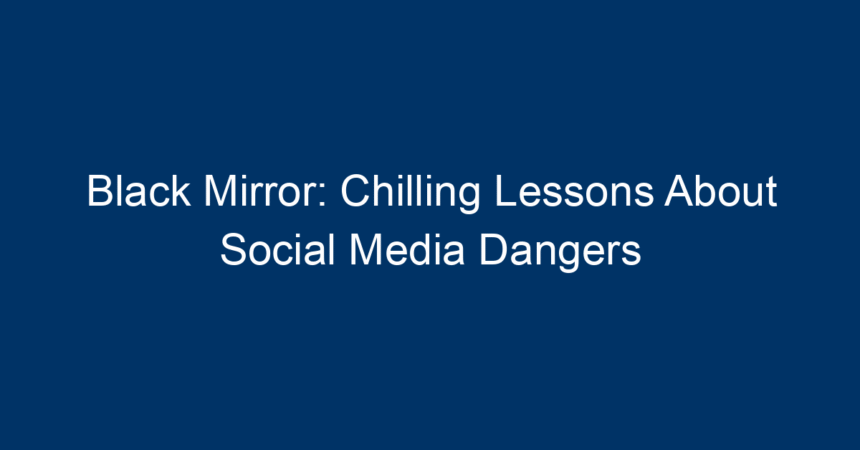In the age of digital connectivity, social media has become a double-edged sword. While it fosters communication and enables sharing, it also poses significant risks to our mental health, privacy, and societal cohesion. One of the most thought-provoking series to explore these dangers is Black Mirror. With its unsettling narratives, the show serves as a cautionary tale about our relationship with technology, particularly social media. In this article, we will delve into the chilling lessons from Black Mirror that highlight the dangers lurking in the shadows of our social media engagement.
The Allure of Social Media
Before we can understand the warnings presented in Black Mirror, it’s essential to recognize why we are drawn to social media platforms. These spaces promise connection, validation, and instant access to information. We curate our lives to show the best versions of ourselves, fostering a sense of community while also grappling with issues like self-esteem and anxiety.
The Illusion of Connection
Black Mirror episodes like “Nosedive” illustrate the illusion of connection that social media creates. In this episode, people are rated based on their interactions, and a person’s social score affects their life opportunities. This premise critiques how social media can reduce human experiences to numerical values, distorting genuine connections.
Validation and Self-Esteem Issues
Social media can become a battleground for validation. In a world where likes and shares count as social currency, it’s easy to equate self-worth with online approval. Black Mirror showcases this theme, making viewers question the consequences of this relentless pursuit of validation.
The Dark Side of Social Media
While social media platforms have their advantages, Black Mirror highlights the perilous consequences of our increasing reliance on these technologies. Let’s explore some of the primary concerns.
Privacy Erosion
One of the most alarming issues raised in Black Mirror is the erosion of privacy. The episode “White Christmas” serves as a stark reminder of how our personal information can be misused. With the rise of surveillance technology and data mining, our every interaction online can be tracked, analyzed, and exploited.
Real-Life Consequences of Online Actions
In “Nosedive,” the social ranking system leads to real-life repercussions. People are ostracized based on their online presence. This culture creates a dangerous feedback loop where negative experiences online can lead to severe consequences offline, affecting mental health and societal interaction.
Cyberbullying and Harassment
The episode “The National Anthem” explores the exploitation of social media for public shaming and manipulation. It underscores how online platforms can amplify negative behavior, leading to cyberbullying and harassment, which can have devastating impacts on individuals.
Narratives That Reflect Reality
The narratives in Black Mirror serve not just as entertainment but as reflections of our own realities. Let’s examine how specific episodes mirror actual societal issues related to social media.
Social Credit Systems: Not Just Fiction
The concept presented in “Nosedive” is not as far-fetched as it might seem. Countries like China are implementing social credit systems that scrutinize citizens’ behavior. This example raises ethical questions about autonomy, freedom, and the impact on mental well-being.
The Automation of Human Interactions
Episodes like “Be Right Back” delve into the idea of digital immortality through social media. As technology advances, the potential for automated interactions raises moral dilemmas about what it means to be human. These episodes challenge viewers to reflect on the authenticity of connections in a tech-driven age.
The Psychological Toll of Digital Engagement
Black Mirror fosters a deeper understanding of the psychological implications that arise from social media usage. Let’s explore some of these effects further.
Anxiety and Depression
The pressure to maintain a perfect online presence can lead to significant anxiety and depression. The portrayal of characters in Black Mirror often mirrors the struggles individuals face daily. The anxiety of gaining likes, the fear of missing out (FOMO), and the constant comparison to others create a toxic cycle that affects mental health.
Sleep Disruption
Excessive social media usage is linked to sleep disturbances. The blue light emitted from screens and the addictive nature of scrolling can lead to sleepless nights. Black Mirror illustrates how technology invades even our most intimate and necessary activities, like rest.
Actionable Insights: Navigating Social Media Wisely
While Black Mirror presents chilling lessons, it also inspires actionable insights on navigating social media in a healthier way:
1. Be Mindful of Usage
Set time limits on social media usage to prevent addictive behaviors. Being mindful of how much time you spend on these platforms can lead to healthier habits.
2. Curate Your Feed
Follow accounts that promote positivity and authenticity. Your online environment can greatly impact your mental well-being, so choose connections that uplift you.
3. Disconnect Regularly
Take regular breaks from social media. A digital detox can help reset your perspective and reduce the anxiety associated with constant connectivity.
4. Engage Authentically
Focus on building genuine connections rather than chasing likes. Engage in meaningful conversations and prioritize quality over quantity in your interactions.
5. Seek Professional Help
If social media affects your mental health, consider speaking to a mental health professional. They can provide strategies to cope with anxiety, depression, or any negative feelings that arise from online experiences.
Conclusion: Embracing the Lessons of Black Mirror
Black Mirror serves as a powerful reminder of the complexities and dangers of social media. By reflecting on its narratives, we can gain valuable insights into the impact of our digital lives. While technology is an integral part of modern existence, it’s essential to approach it with caution and mindfulness.
Understanding the lessons from Black Mirror will not only prepare us for the challenges ahead but also empower us to build healthier relationships with social media. As we navigate this digital landscape, let’s commit to fostering connections that enrich our lives rather than diminish them. The chilling scenarios depicted in Black Mirror should spur us into action, ensuring our real-world interactions remain authentic and fulfilling.




